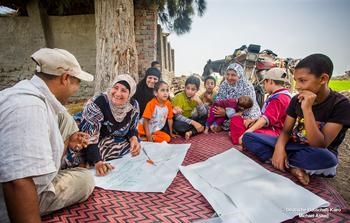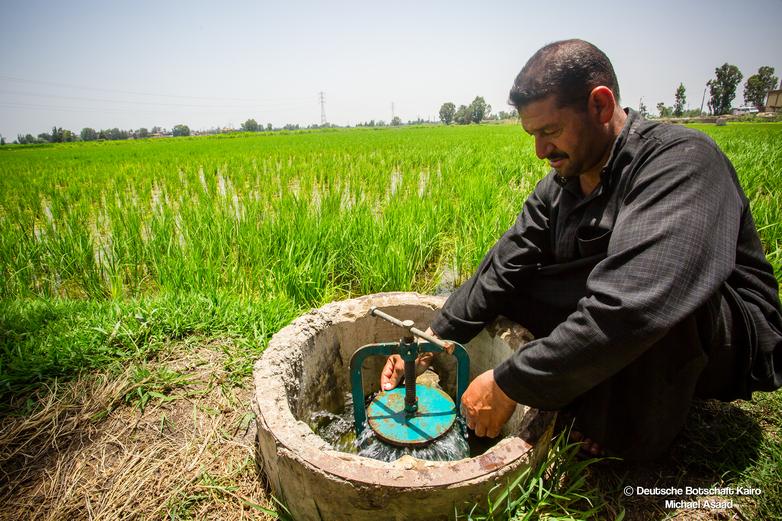Vorgehensweise
Das Projektteam, dem Vertreter der GIZ und verschiedener Stellen des Landwirtschaftsministeriums angehören, unterstützt Bauern und Behörden im Nildelta dabei, optimierte Verfahren für ein integriertes Wasserressourcenmanagement in der Bewässerungslandwirtschaft anzuwenden. Der Schwerpunkt liegt auf den beiden Nildelta-Gouvernements Kafr el Sheikh und Beheira.
In der Vergangenheit hat das Projekt innovative Verfahren für ein integriertes Wasserressourcenmanagement entwickelt. Es schult Institutionen, die für die Bewässerungslandwirtschaft zuständig sind, und optimiert ihre internen Prozesse. Die Projektcoaches, die sich derzeit mit der Ausweitung dieser Maßnahmen beschäftigen, haben Multiplikatoren ausgebildet, die Bauern und ihre Verbände dabei unterstützen, eine effiziente und effektive Wassernutzung auf ihren Feldern einzuführen.
Wirkungen
Um den Betrieb und die Wartung der neuen Bewässerungsinfrastruktur langfristig zu gewährleisten, hat das Projekt auch Pumpenbetreiber, Hilfskräfte und Vorstandsmitglieder von Wassernutzergemeinschaften von 500 modernisierten Pumphäusern geschult und mit einfachen Werkzeugen für den täglichen Betrieb und für Wartungsvorgänge ausgestattet Die Landwirte wurden mit der Entwicklung von jährlichen Arbeitsplänen für Betrieb und Wartung vertraut gemacht. 100 Jungbauern und Techniker aus Distriktgenossenschaften werden für komplexere Wartungsaufgaben geschult und können Landwirten mit defekten Geräten ihre Dienstleistungen anbieten. Außerdem hat das Vorhaben bisher 3 von 10 vorgesehenen Wartungszentren der landwirtschaftlichen Genossenschaften ausgestattet und arbeitet gemeinsam mit seinen Partnern am Aufbau von Reparaturzentren.
Damit das Landwirtschaftsministerium und die Bauerngenossenschaften den Wasserbedarf der Landwirte in ihrem Einzugsgebiet besser bestimmen und überwachen können, erhebt das Projektteam Daten über die tatsächlichen Bewirtschaftungsflächen die von den einzelnen Bewässerungskanälen versorgt werden. Bisher wurden über 750 Genossenschaften, deren 700.000 Landwirte über 1.000.000 Feddan (430.000 Hektar) bewirtschaften, mithilfe von neu eingeführten Geographischen Informationssystemen (GIS) in den Gouvernements Kafr El Sheikh und Beheira ausgebildet. Dadurch können sie nun die aktualisierten Karten als Grundlage für die Erfassung der Anbaustrukturen der Landwirte nutzen, die wiederum zur Planung der Wasserverteilung an das Ministerium für Wasserressourcen und Bewässerung übermittelt werden.
Im Rahmen des Vorhabens haben sich bedarfsorientierte Ansätze zur landwirtschaftlichen Beratung, wie z. B. die Farmer Field Schools, als sehr erfolgreich erwiesen. Anhand der begleitenden Demonstrationsfelder können die Landwirte die theoretischen Grundlagen für eine effiziente Agrar- und Bewässerungspraxis vor Ort praktische anwenden. Kleinbauern, die an den Farmer Field Schools teilgenommen haben, berichteten von Ertragssteigerungen von bis zu 25 Prozent bei einem um bis zu 20 Prozent geringeren Verbrauch von Bewässerungswasser. Bislang wurden 448 Farmer Field Schools eingerichtet, mit denen rund 9.000 Kleinbauern erreicht und beraten wurden. Um den Bedarf an zusätzlichen Vermittlern der Farmer Field Schools zu decken, stehen seitens des Beratungsservices Trainer zur Verfügung, die ihr Wissen weitergeben.
Neben mehr als 4.000 Landwirten wurden 120 landwirtschaftliche Berater geschult, um verschiedene Methoden der Ernterückstandsbewirtschaftung wie Kompostierung oder die Verwendung als innovatives Futtermittel zu verbreiten. Dadurch bieten sich wirtschaftlich sinnvolle Alternativen zur Verbrennung von Pflanzenresten oder deren Verbleib neben den Be- und Entwässerungskanälen. Diese qualifizierten landwirtschaftlichen Berater können nun auch über die Projektlaufzeit hinaus Schulungen durchführen.
Angesichts der Schlüsselrolle, die den Bauernverbänden bei der Förderung von Kooperationsmaßnahmen für eine effektivere und effizientere Wassernutzung zukommt, haben über 50 Genossenschaften, die zusammen rund 45.000 Landwirte vertreten, technische Unterstützung erhalten. Dabei wurden sie über ihre im neuen Gesetz festgelegten Rechte aufgeklärt; gleichzeitig wurden den Begünstigten die organisatorischen und finanziellen Managementkapazitäten vermittelt, die für eine bessere Mitgliederbetreuung notwendig sind. Auf dieser Grundlage können sie nun neue Geschäftsideen entwickeln. Um ein Up-scaling zu ermöglichen werden Vorstandsmitglieder und Führungskräfte von Genossenschaften auf ihre Tätigkeit als Mentoren vorbereitet.
Zur Stärkung der Rolle von Frauen in der Bewässerungslandwirtschaft wurden über 300 Landwirtinnen dafür ausgebildet, Pilotprojekte für Fraueninitiativen durchzuführen, mit denen Frauen sich neue Möglichkeiten der Einkommensgenerierung erschließen können. Um den Bedarf vor Ort zu decken und das Potenzial kleiner Anbauflächen zu nutzen, haben die Frauen gelernt, wie man innovative Strategien für eine Nahrungsmittelproduktion mit geringerem Wasserverbrauch und die Bewirtschaftung landwirtschaftlicher Reststoffe plant und umsetzt. Dazu zählen beispielsweise die Wiederverwendung von organischen Abfällen aus der Landwirtschaft als Substrat für den Anbau von Pilzen oder Gerste als Frischfutter sowie die Einführung bodenloser landwirtschaftlicher Systeme wie Hydrokultur und Aquaponik.
Durch die Einrichtung von digitalen Beschwerdemanagementstellen auf Distriktebene bzw. in den beiden Gouvernements können Landwirte ihre Beschwerden nun auf einem transparenten Weg einreichen und verfolgen. Dadurch hat das Landwirtschaftsministerium wiederum die Möglichkeit, Brennpunkte zu analysieren und schnell geeignete Lösungen zu realisieren und die zuständigen Stellen mit geeigneten Maßnahmen zu beauftragen.


